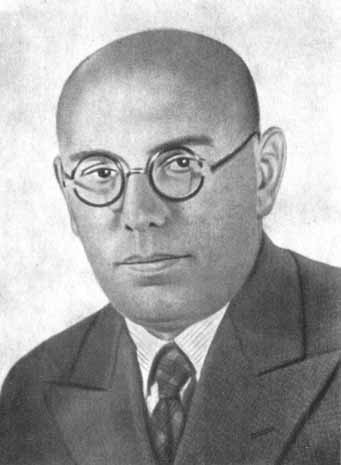Fefer, Isaac
Fefer, Isaac or Feffer, Itsik (Фефер, Ісаак or Іцик), b 9 October 1900 in Shpola, Kyiv gubernia, d 12 August 1952 in Moscow. Yiddish poet and Communist activist. In 1917 Fefer became a member of the Bund and a trade union activist. He then joined the Communist movement in 1919 and served in the Red Army during the Civil War. He began writing poetry in 1918 and gained recognition as a Yiddish poet, whose work focused primarily on political themes and romantic depictions of the revolutionary struggle. In 1927 Fefer was a founding member of the Jewish Section of the All-Ukrainian Association of Proletarian Writers and edited and published a number of Yiddish periodicals and books in Kharkiv and Kyiv in the 1930s. He also became a member of the Writers’ Union of the USSR. A member of the Communist Party of the Soviet Union, he was a city councillor in Kyiv. Fefer’s poetry changed during the Second World War and his epic poems, such as ‘Di Shotns fun Varshever Geto’ (The Shadows of the Warsaw Ghetto), were dedicated to the themes of the Holocaust and the destruction of the Eastern European Jewry. Between 1942 and 1945 he worked on the editorial board of the newspaper Eynikayt. Fefer was one of the leaders of the Jewish Anti-Fascist Committee (JAFC), where he served as vice-chairman and secretary. He was also an NKVD agent on this committee.
In 1943, together with theater director Solomon Mikhoels, Fefer visited the United States, Canada, Mexico, and England to promote support for the Soviet Union and the opening of a second front in Europe. In the United States, he and Mikhoels met with the Committee of Jewish Writers and Artists in the United States, the Jewish Council for Russian War Relief, and other organizations. In September 1943 they visited Montreal, where they met with representatives of the Canadian Jewish Congress, and Toronto, where Fefer spoke at a mass rally to a crowd of some 12,000 people at the Maple Leaf Gardens. During his address, he also spoke in Ukrainian and was cheered by the Ukrainian Canadians in the audience. During their visits to the United States, Canada, and England, Fefer and Mikhoels established close personal contacts with members of the Jewish communities in these countries. They returned to the Soviet Union with a wider appreciation of the Jewish life outside of the Soviet Union and initiated discussions to have the JAFC join the World Jewish Congress to end the isolation of Soviet Jews. They planned to present a report to a Jewish Conference in the Soviet Union on Jewish life in the United States in 1944. In February 1944, together with Mikhoels and Shakne Epshtein, Fefer signed a letter to Joseph Stalin with a request to organize an autonomous Jewish region in the Crimea. However, after the founding of the state of Israel, the Soviet regime began to suspect CPSU members who supported the aims of the Jewish diaspora outside the Soviet Union. During the Stalinist purges of Jewish activists, Fefer was arrested in Moscow in 1948 in connection with the so-called ‘affair of the Jewish Anti-Fascist Committee,’ imprisoned, and subjected to torture. In July 1952 he was charged with membership in an anti-Soviet conspiracy organized by Jews in the United States, and on August 12, together with other members of the Jewish Anti-Fascist Committee, he was executed in the Lubianka Prison in Moscow. Fefer was posthumously ‘rehabilitated’ in 1955.
Myron Momryk
[This article was updated in 2024.]
.jpg)
